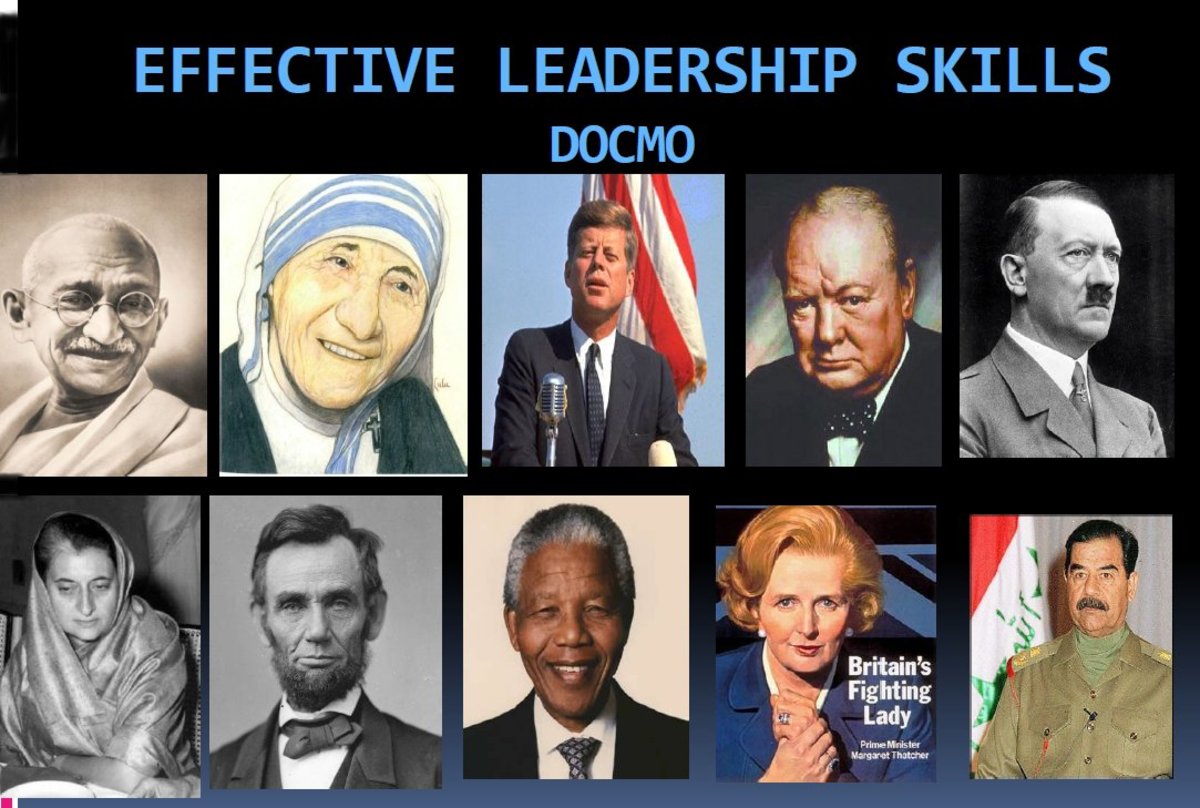What is Leadership Theory?

Leadership can be described as the ability of an individual or team of individuals to exert influence over one or more other individuals in a manner that those others are moved to change their behaviors in a direction proposed by the leader or join to collaborate to accomplish a task or objective as outlined by the leader. Leadership Theory is the study of the various facets that are related to the practice of influencing others. This hub discusses the development of leadership theory.
Leadership Study Programs


The History of Leadership Theory
Gary Yukl (2006) and Peter Northouse (2010) are two of many organizational behavior researchers who have dedicated themselves to report on the development of leadership theory. Although researchers and biographers wrote about leaders and the exploits of leaders for many centuries, the study of leadership and the development of leadership theory did not seem to take place until the beginning of the 20th century when industrialists like Frederick Winslow Taylor began to become more analytical about organizations as mechanisms. From that time forward, the pursuit to understand the role of leadership in the success or failure of organizations grew increasingly more prominent and continued to do so into the second decade of the 21st century.
While individual researchers took up the mantle to study management and leadership theory in the 1920s and 1930s (e.g., Kurt Lewin and Max Weber), the first institutions in the United States to make concerted efforts to study leadership practices was Ohio State University in the 1940s and the University of Michigan in the 1950s. MIT joined the movement in the 1960s with Douglas McGregor's development of Theory X nd Theory Y at the Sloan School of Management.
The University of San Diego opened the first doctoral degree program in Leadership Studies in 1979 and the University of Richmond offered the first undergraduate program in Leadership Studies in 1992 through The Jepson School. As of 2012, the number of organizational leadership programs offered either by traditional brick and mortar or online oriented higher education institutions grew to over 500. All this to show how the prominence in the study of leadership and formulation of leadership theory continued to expand in increasing measure from the early 20th century to the early 21st century.
The Purpose of Leadership Theory
The purpose of leadership theory can be described as a pursuit to identify and describe best and worst practices in the field of leadership in order to assist organizations achieve optimal performance and sustainability. Leadership theory is about analyzing the attitudes and activities of organizational and business leaders in order to gain insight into different styles of leadership and to ascertain how different styles of leadership work in different cultural and organizational cultural contexts. Since 1988, The work of Robert Kelley, Ira Chaleff, and others leadership theory expanded to include followership theory in an effort to identify how particular leadership styles impact followers with different personalities and tendencies and vice versa.
The Fruit of Leadership Theory
The study of leadership from 1905 to 2012 defined and redefined numerous theories and conceptual models of leadership theories and leader best practices.
The first theories concerning leaders offered were what organizational behavior scholars described as Great Man or trait theories. Great Man and trait theory proposed that certain individuals were born with personality traits that moved them to the head of the crowd. In these cases, the researchers believed that leadership skills were part of the person's DNA and that those lacking the proper genes and chromosomes could not be taught to be effective leaders. Within the great man and trait theory framework, certain sociologists like Kurt Lewin and Max Weber identified a number of leadership styles including democratic, authoritarian, and laissez faire as well as charisma in leadership. In the late 1940s, Robert Stodgill discovered a number of particular traits that seemd to separate leaders from followers.
In the 1950s, researchers began to take a closer look at the skills and behaviors of leaders. As they did so, leadership theory began to shift to the belief that effective leadership was more than inherent in the personality of the leader. Led by Robert Katz in 1955, behavioral scientists and researchers began to propose that an individual only needed to acquire the right skill sets and practice the right behaviors in order to exert effective influence on others. This meant that individuals could be taught and trained to be effective organizational directors.
In the 1950s, leadership theory moved toward identifying specific behaviors of leaders which led to the coining of names of leadership styles. Along with Lewin's three (including authoritarian, democratic, and laissez-faire) new leadership theories included
- Participatory leadership - the inclusion of followers and other stakeholders in the decision-making process
- Contingency leadership (Fiedler) - a given leader will be most effective in a context best suited for his or her leadership style
- Situational leadership (Hersey & Blanchard) - effective leaders shift their approach to followers deending on the follower's level of commitment and development
Like situational leadership theory developed in 1969, the 1970s welcomed more leadership theories were conceptualized that attempted to define the leadership in terms of the relationship to followers. Those theories included:
- Path-goal theory (Robert House, 1971) - identified four leadership styles and proposed how leaders will shift their styles depending on the needs of the follower
- Leader-member exchange theory (LMX - Dansereau, Graen, & Haga, 1975) - based on social exchange theory, leaders interact differently with different follower-subordinates based on the similarity of personalities and attitudes
- Charismatic leadership (Robert House, 1976; more fully defined Weber's concept) -
- Transformational-transactional theory (John McGregor Burns, 1978; Bernard Bass, 1985)
- Servant leadership (Robert Greenleaf 1970, 1977; albeit not prominently until 1995)
From the mid-1990s to 2012, leadership theory shifted focus to more positive, ethical leadership behaviors that take into account the well-being and personal goals of followers. The urgency to develop and promote more ethical styles was precipitated by the widespread corporate scandals that came to light in the first decade of the new millennium. Leadership conceptual models that gained greater attention during that time included:
- Transformational leadership - as of the time of this writing, the most researched and promoted leadership style in the field of leadership studies around the globe
- Servant leadership (Robert Greenleaf as interpreted by his protégé Larry Spears, 1995) - a follower-centered leadership style that places the needs of followers above the needs of the organization or leader
- Authentic leadership (Robert Terry, 1993; Bill George, 2003 and Fred Luthans and Bruce Avolio, 2003; and Gardner & Avolio, 2005) - a call to more transparent leadership behaviors
Other leadership sryles in the positive ethical thread include:
- Spiritul leadership (Louis Fry)
- Resonant leadership
The age of globalization has brough about leadership theories such as cross-cultural and tribal leadership that highlight approaches to leading among those from different ethnic groups and national cultures and the efficacy of indigenous leader practices over against practices exported from outside the culture.






